12 Best Investment Apps for Beginners in 2025
Discover the best investment apps for beginners. Our in-depth reviews cover fees, features, and pros/cons to help you start your investing journey.

Stepping into the world of investing can feel overwhelming, but the right app makes all the difference. The market is filled with platforms designed to simplify stock, ETF, and even crypto trading for newcomers, but with so many options, how do you find the one that fits your specific goals, budget, and learning style? This guide is designed to cut through the noise and provide clear, actionable insights. We’re here to help you identify which of the best investment apps for beginners aligns perfectly with your financial journey, whether you're a long-term stock investor, a dividend-focused planner, or just starting to explore crypto assets.
We've meticulously analyzed the top 12 platforms, including giants like Fidelity and innovative fintechs like Robinhood and Acorns. Instead of just listing features, we provide a detailed, side-by-side comparison that highlights practical use cases, fee structures, and the overall user experience. Each review includes screenshots and direct links, so you can see exactly how the platforms work. Our goal is to equip you with the information needed to move past analysis and confidently select the app that will help you start building your financial future today. Let's find the right tool for your portfolio.
1. PinkLion
PinkLion establishes itself as an exceptional all-in-one investment management platform, making it one of the best investment apps for beginners who want professional-grade tools without a steep learning curve. It excels at consolidating your entire financial picture by automatically integrating with multiple brokerage accounts. This allows you to track stocks, ETFs, and over 5,000 cryptocurrencies in a single, intuitive dashboard.
Its true power lies in its advanced analytics. PinkLion moves beyond simple portfolio tracking by offering AI-driven tools like scenario simulations and stress testing. This allows even novice investors to understand how their portfolio might perform during market downturns, evaluate "what-if" scenarios, and make data-backed decisions aligned with their long-term goals.
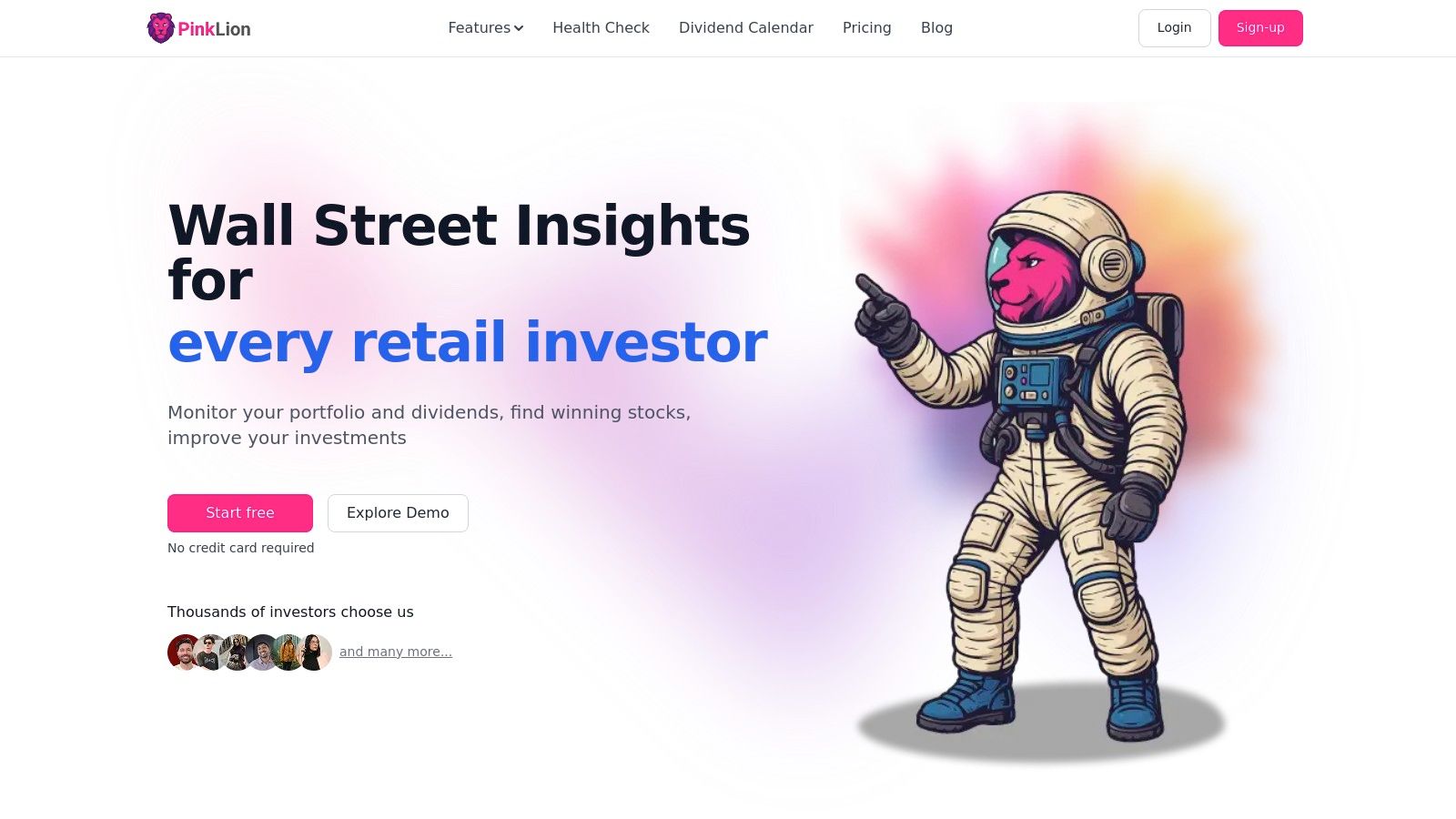
Key Features & Use Cases
- Holistic Portfolio View: Seamlessly connect all your investment accounts to get a unified view of your net worth and performance. This is ideal for investors with assets spread across different platforms who need clarity and control.
- AI-Powered Forecasting: Use the one-year asset forecast and portfolio optimization tools to strategically adjust your holdings. For a beginner, this feature provides a glimpse into potential outcomes, helping build confidence in their investment strategy.
- Dedicated Dividend Tracking: Dividend-focused investors will appreciate the detailed dividend calendars and cash-flow monitors. These tools make it easy to track income distributions and plan reinvestment strategies effectively.
Our Assessment
PinkLion stands out by making sophisticated portfolio analysis accessible. While it doesn't offer direct financial advice, its AI-driven insights empower users to develop a deeper understanding of risk and reward. The platform supports unlimited holdings and draws on 30 years of historical data for robust backtesting. A free-to-start model with no credit card required lowers the barrier to entry, allowing you to explore its powerful features firsthand.
- Pros: Comprehensive multi-asset tracking, advanced AI analytics (simulations, stress tests), excellent dividend-focused features, user-friendly interface.
- Cons: Premium pricing details are not immediately clear
- Website: https://pinklion.xyz
2. Robinhood
Robinhood pioneered commission-free trading, making it a household name and one of the best investment apps for beginners focused on active trading. Its mobile-first interface is incredibly intuitive, removing much of the intimidation factor associated with traditional brokerages. You can start trading stocks, ETFs, options, and even cryptocurrencies with just a few taps.
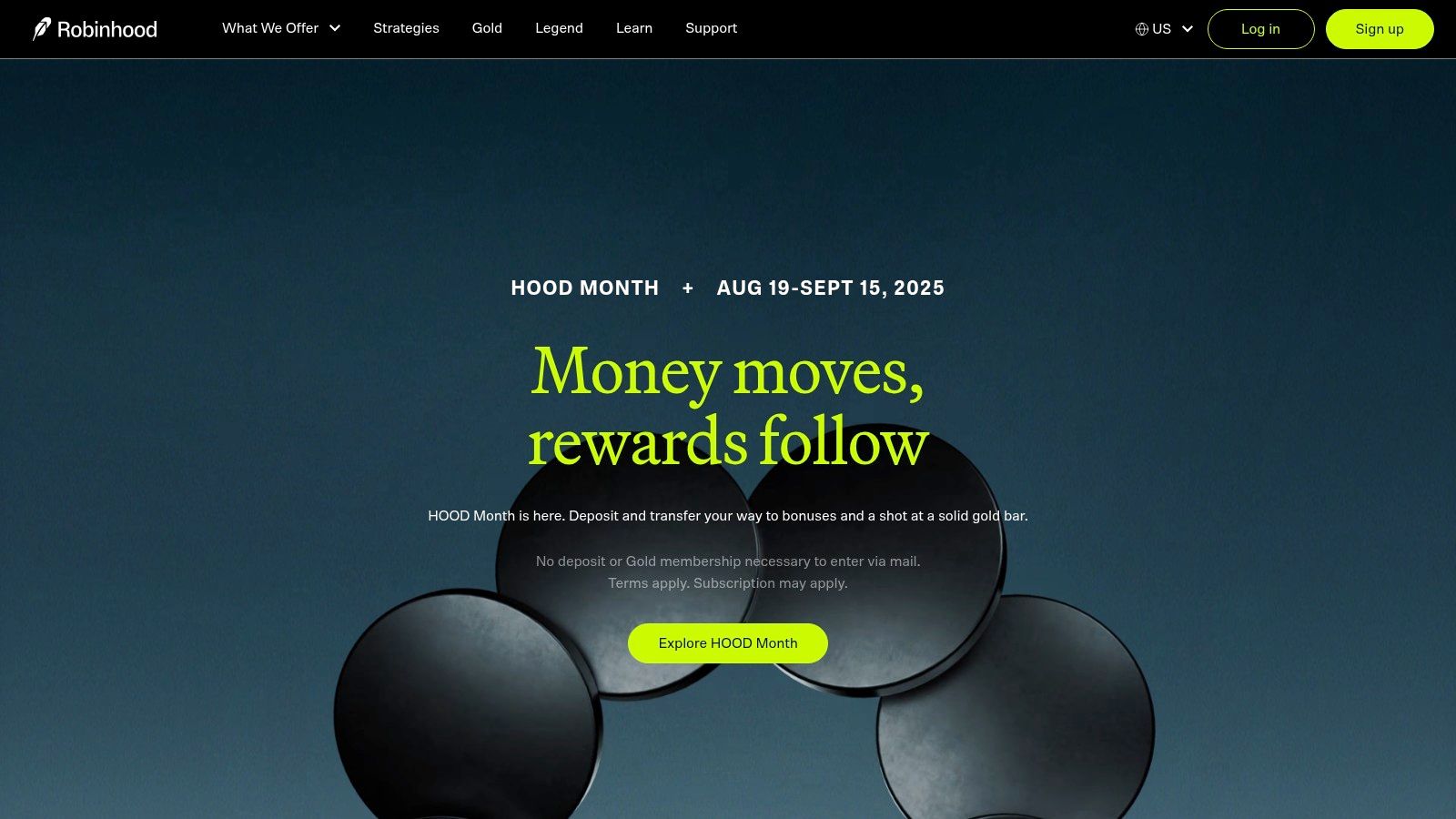
The platform’s support for fractional shares means you can invest in high-priced stocks like Amazon or Alphabet with as little as $1. Robinhood also offers retirement accounts (IRAs) and a premium tier, Robinhood Gold, which provides benefits like a high-yield cash sweep and access to advanced market data. The in-app educational resources are a significant plus for anyone just starting their investment journey.
Key Features & Costs
Pros:
- Exceptionally Low Cost: The $0 commission structure is ideal for new investors.
- User-Friendly Interface: The app is clean, simple, and easy to navigate.
- Fractional Shares: Enables investment in expensive stocks with minimal capital.
Cons:
- Regulatory Scrutiny: The platform has faced public and regulatory challenges, which may be a concern for some users.
- Changing Features: Premium benefits and promotions can change; always verify the current terms.
As you explore different companies on the platform, understanding how to analyze their long-term potential is crucial. For deeper insights, you can review our guide on how to evaluate investment opportunities.
Visit Robinhood
3. Fidelity Investments
Fidelity is a full-service brokerage powerhouse that has brilliantly adapted for the modern investor, making it one of the best investment apps for beginners seeking a long-term, all-in-one platform. It combines robust features with an accessible interface, offering everything from self-directed trading to automated investing. The platform is known for its extensive research tools and excellent customer support, providing a strong foundation for new investors to grow.

With Fidelity, you can start investing with just $1 through fractional shares, called "Stocks by the Slice," across thousands of U.S. stocks and ETFs. For those who prefer a hands-off approach, the Fidelity Go robo-advisor offers professional portfolio management with no advisory fees on balances under $25,000. This blend of active and passive investing options, backed by a trusted industry name, makes it an outstanding choice for building a diversified portfolio.
Key Features & Costs
Pros:
- One-Stop Platform: Seamlessly combines self-directed trading with a capable robo-advisor.
- Robust Support: Offers extensive educational content and top-tier customer service.
- Easy Diversification: Fractional shares make it simple to build a balanced portfolio on a budget.
Cons:
- Robo-Advisor Fee Threshold: The advisory fee for Fidelity Go begins at the $25,000 mark, which could be a surprise for growing accounts.
- Overwhelming for Some: The sheer volume of tools and research can be intimidating for absolute beginners.
Fidelity's commitment to education helps new investors make informed decisions, which is a critical skill for sustainable growth.
Visit Fidelity
4. Charles Schwab
Charles Schwab is a highly reputable, full-service brokerage that offers one of the best investment apps for beginners seeking a blend of powerful tools and long-term stability. Its mobile platform is well-designed and straightforward, providing access to a massive selection of investment products, from stocks and ETFs to mutual funds and bonds, without overwhelming a new user.
Schwab stands out by offering fractional shares, branded as “Stock Slices,” which let you invest in any S&P 500 company for as little as $5. This feature is perfect for beginners wanting to own a piece of major companies without a large capital outlay. The firm also provides an excellent robo-advisor service, Schwab Intelligent Portfolios, and maintains physical branches for those who value in-person support, a rarity in the digital brokerage space.
Key Features & Costs
Pros:
- Strong Reputation: A long-standing, trusted name in the industry.
- Excellent Research: Provides access to high-quality market research and educational tools.
- Physical Branches: Offers the option for in-person customer service and guidance.
Cons:
- Limited Fractional Shares: Stock Slices are only available for S&P 500 companies.
- Slightly Less Sleek App: The mobile app is functional but may feel less modern than some newer competitors.
For those just starting, the wealth of educational content and robust customer support makes Schwab a secure and reliable choice for building a long-term portfolio.
Visit Charles Schwab
5. Vanguard
Vanguard is a titan in the world of low-cost investing, making it an excellent choice for beginners focused on long-term, buy-and-hold strategies. While known for its mutual funds and ETFs, its platform offers a robust self-directed brokerage and a highly accessible robo-advisor, the Vanguard Digital Advisor. This makes it one of the best investment apps for beginners who prioritize stability and low fees over active trading.
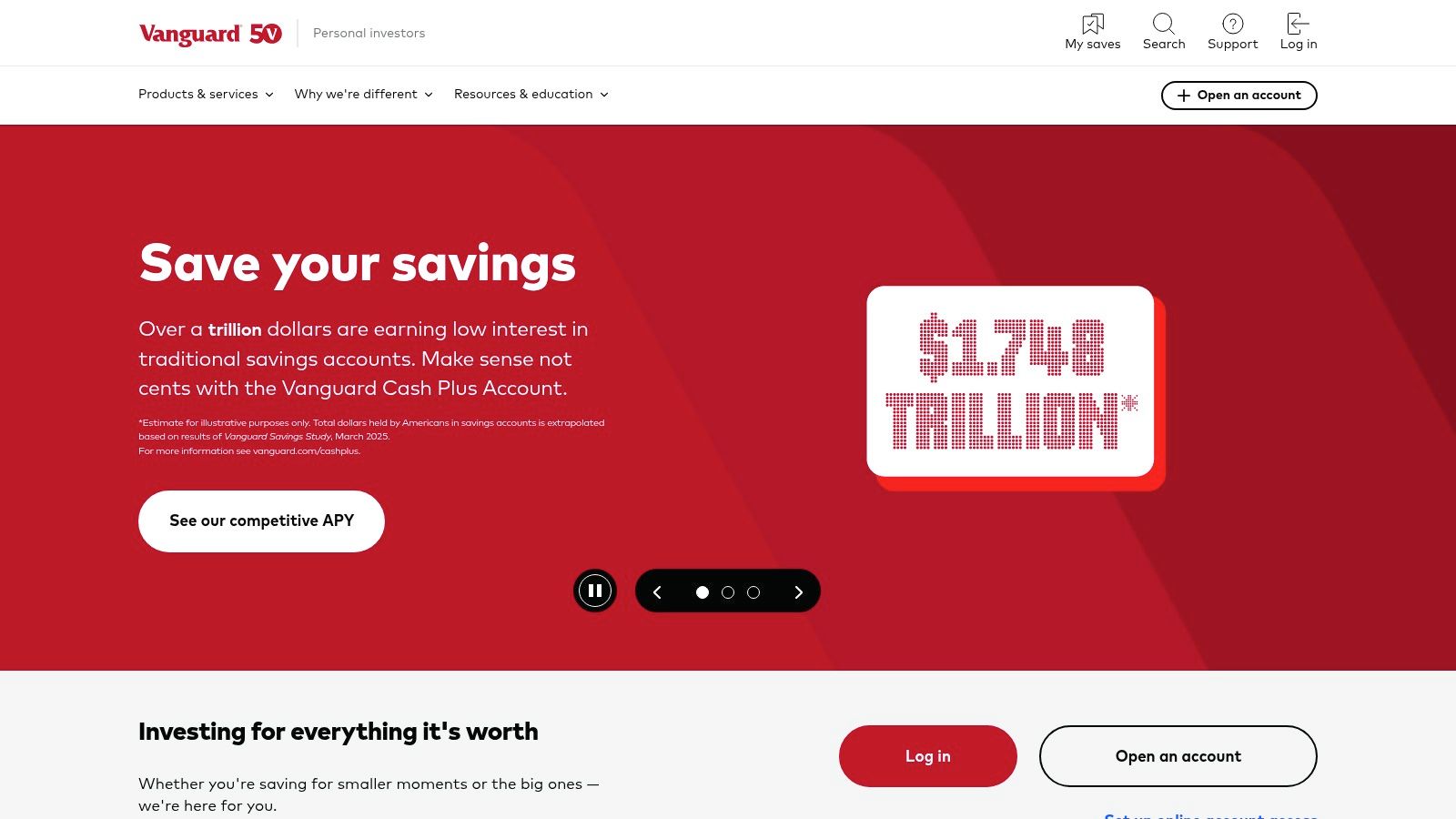
The company’s philosophy centers on diversified, low-cost index fund investing, which is a proven strategy for building wealth over time. The Digital Advisor service automates this process for a minimal fee, building a portfolio for you based on your financial goals. For those who prefer a hands-on approach, trading Vanguard ETFs is typically commission-free, allowing you to build a custom portfolio without high overhead.
Key Features & Costs
Pros:
- Extremely Low Costs: Industry-leading low expense ratios and advisory fees save you money long-term.
- Long-Term Philosophy: The platform is built to encourage sound, long-term investment habits.
- Accessible Robo-Advisor: The low minimum makes professional portfolio management available to nearly everyone.
Cons:
- Slower User Experience: The app and website can feel less modern and slower than mobile-first competitors.
- Not for Active Traders: The platform is not designed for frequent, short-term trading.
Vanguard's emphasis on broad market exposure is a core tenet of building a resilient portfolio. To better understand this approach, read our guide on how to diversify an investment portfolio.
Visit Vanguard
6. Morgan Stanley E*TRADE
Morgan Stanley E*TRADE is a powerhouse brokerage that provides a full-featured yet surprisingly beginner-friendly experience. It bridges the gap between simple, no-frills apps and complex professional platforms, offering an excellent growth path for new investors. Users can trade stocks and ETFs with $0 commissions, access a wealth of educational resources, and even utilize an integrated robo-advisor, Core Portfolios.
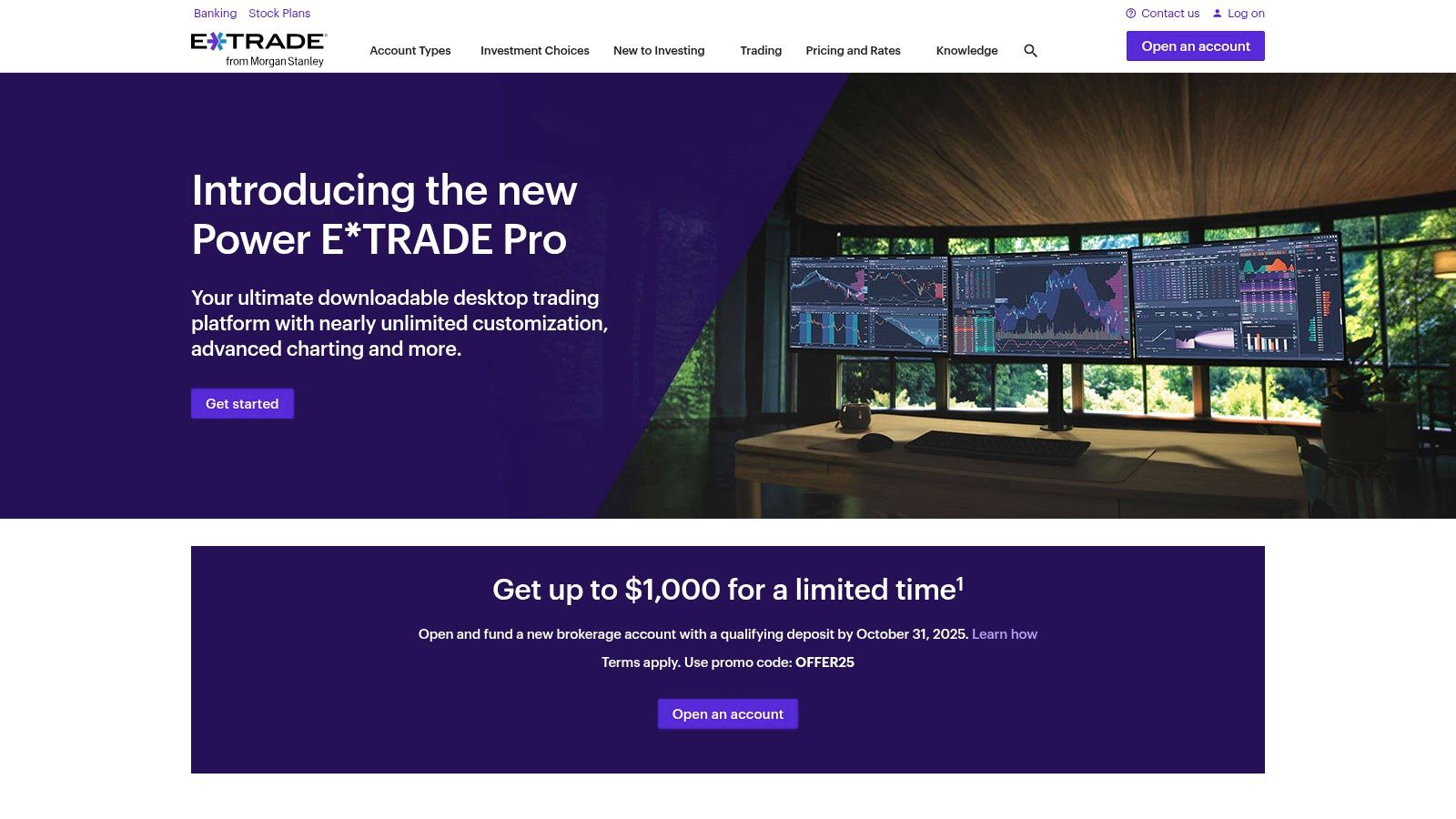
What makes E*TRADE one of the best investment apps for beginners is its comprehensive nature combined with a clean interface. Beyond standard trading, it offers a wide range of account types and integrated banking products for seamless cash management. This all-in-one approach allows you to manage your entire financial life, from initial investments to long-term retirement planning, all within a single, trusted ecosystem.
Key Features & Costs
Pros:
- Robust Tools & Education: Offers powerful research tools and educational content that grow with you.
- All-in-One Platform: Integrates investing, retirement, and banking products seamlessly.
- Broad Investment Selection: Provides access to stocks, ETFs, mutual funds, bonds, and more.
Cons:
- Fees for Some Products: Options contract fees and commissions on OTC stocks are higher than some competitors.
- Can Be Overwhelming: The sheer number of features may feel extensive for absolute beginners.
The platform is ideal for those who want a long-term home for their investments. As you build your portfolio, understanding different investment strategies will be key to your success.
Visit Morgan Stanley E*TRADE
7. SoFi Invest
SoFi Invest is a powerful all-in-one platform that makes it one of the best investment apps for beginners seeking a holistic approach to their finances. It uniquely combines active, self-directed trading with a robust automated robo-advisory service, all integrated within SoFi's broader ecosystem of banking and loans. This allows you to manage saving, spending, and investing in a single, cohesive app.
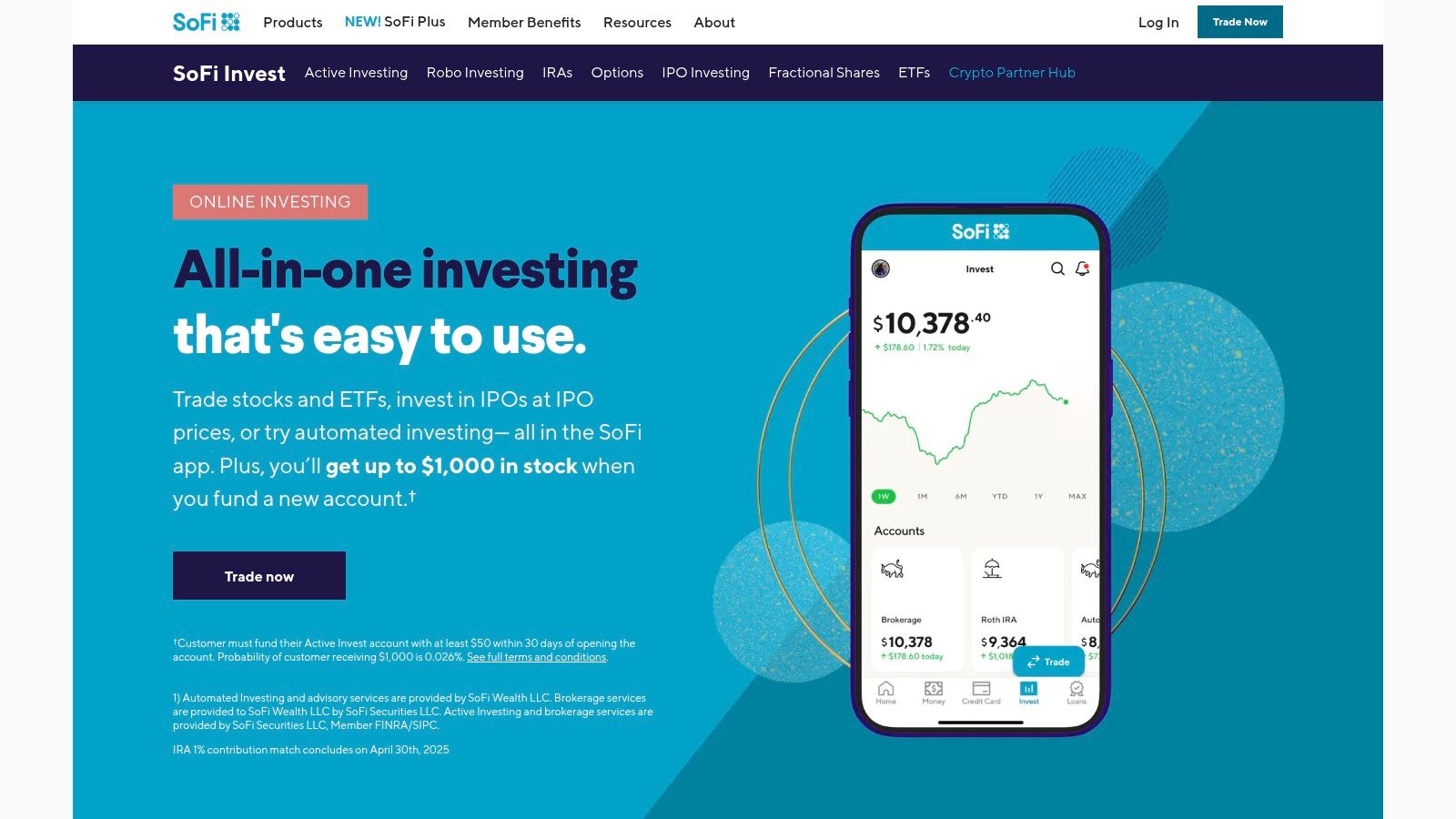
The platform supports fractional shares, called "Stock Bits," allowing you to invest in a piece of your favorite companies with as little as $5. For those who prefer a hands-off approach, SoFi's Automated Investing builds a diversified portfolio for you and offers complimentary access to certified financial planners. This combination of active and passive investing, along with professional guidance, provides a flexible pathway for new investors.
Key Features & Costs
Pros:
- All-in-One Finance App: Seamlessly integrates investing with banking, loans, and other financial products.
- Hybrid Investing Model: Offers both active trading and a managed robo-advisor to suit different comfort levels.
- Access to Financial Planners: A rare and valuable feature for beginners seeking professional guidance.
Cons:
- Limited Fractional Shares: Stock Bits are not available for every single stock or ETF.
- Batched Order Execution: Some fractional share trades are executed in batches, which can result in minor price variations.
Learning to balance a portfolio is a key skill for any new investor. SoFi's platform makes diversification simple, but for more advanced strategies, consider exploring our guide on asset allocation for beginners.
Visit SoFi Invest
8. Webull
Webull is a powerful trading platform that offers a more advanced experience than many competitors, making it one of the best investment apps for beginners who want to grow into more sophisticated analysis. The platform provides commission-free trading for stocks, ETFs, and options, alongside powerful charting tools and in-depth market data, all within a sleek mobile and desktop interface. This makes it a great choice for those who want to learn technical analysis from the start.
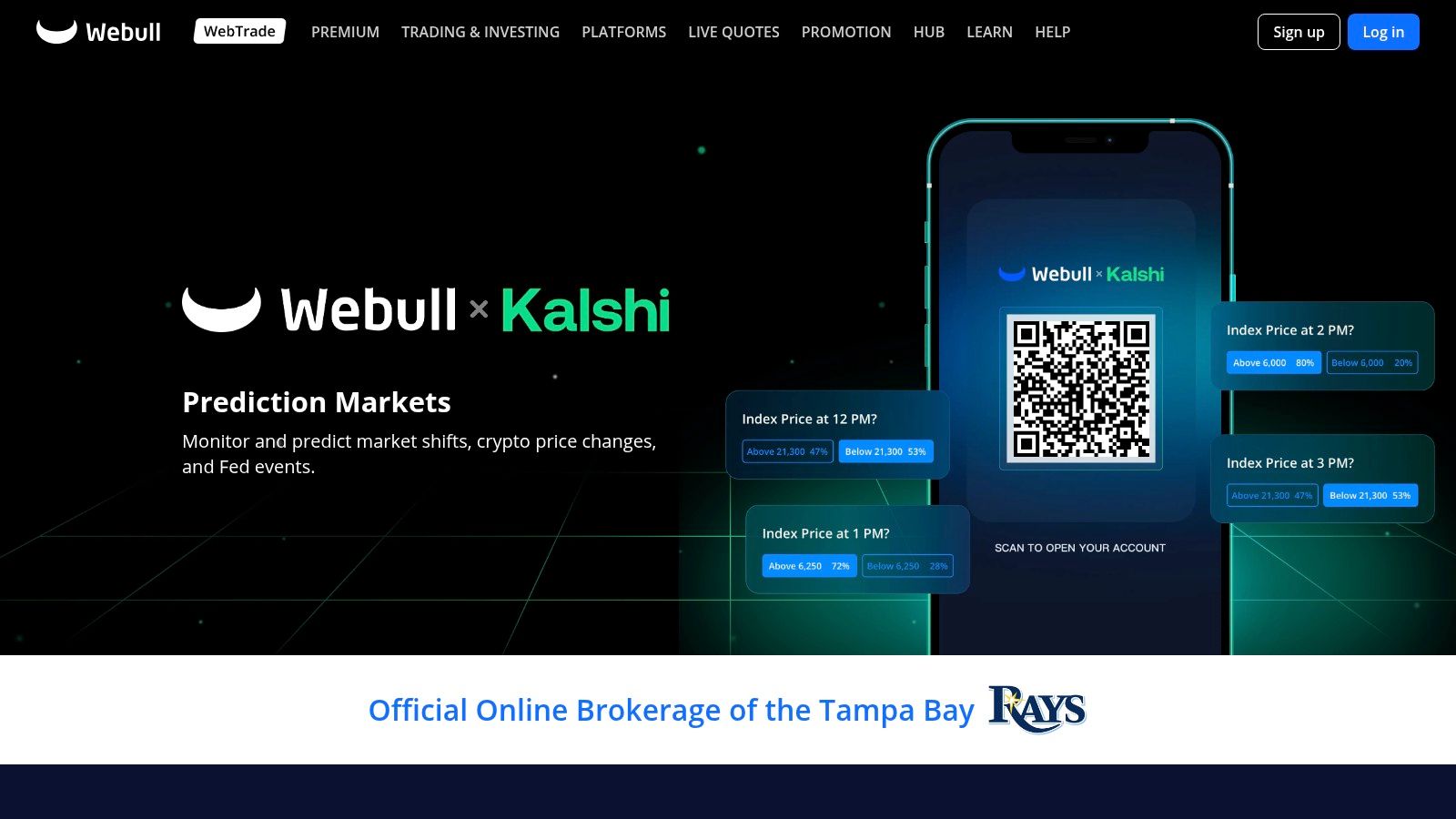
Unique features like paper trading allow users to practice their strategies without risking real money, a significant benefit for new investors. Webull also supports retirement accounts (IRAs) and gives users access to Bitcoin ETFs. Its premium subscription unlocks even more data, like Level II quotes, offering a deeper look into market dynamics for those ready to take the next step in their trading journey.
Key Features & Costs
Pros:
- Feature-Rich Platform: Offers advanced charts and educational tools for serious learners.
- Generous Incentives: Frequently provides onboarding promotions and free stock offers.
- Crypto ETF Access: Allows investment in crypto-related ETFs within standard and retirement accounts.
Cons:
- Potential Overwhelm: The powerful features may be too complex for absolute beginners.
- Steeper Learning Curve: The platform is less intuitive than some simpler alternatives.
Visit Webull
9. Acorns
Acorns makes investing nearly effortless by turning spare change into a diversified portfolio. As one of the best investment apps for beginners, its standout "Round-Ups" feature automatically invests the difference from your daily purchases, making it perfect for those who want to build wealth without thinking about it. The platform places you in one of several expert-built ETF portfolios based on your risk tolerance, removing the guesswork of picking individual stocks.

This set-it-and-forget-it approach is ideal for building consistent saving and investing habits. Acorns also offers retirement (IRA) and custodial accounts for kids, making it a holistic financial wellness tool. Its subscription-based model is transparent, bundling various banking and investing features together, while its in-app educational content helps users grow their financial literacy as their portfolio grows.
Key Features & Costs
Pros:
- Effortless Automation: The Round-Ups feature makes investing a background activity.
- Builds Good Habits: Encourages consistent saving and investing with minimal effort.
- All-in-One Platform: Integrates investing, retirement, and banking tools.
Cons:
- Fee Structure: The flat monthly fee can be a high percentage for very small account balances.
- Limited Control: Investors cannot choose their own stocks or ETFs.
Visit Acorns
10. Stash
Stash offers a unique, subscription-based approach to investing, making it one of the best investment apps for beginners focused on education and long-term habits. The platform combines investing, banking, and saving into one cohesive experience, guiding users through creating a diversified portfolio with fractional shares of stocks and themed ETFs. Its goal is to make consistent investing feel intuitive and achievable.
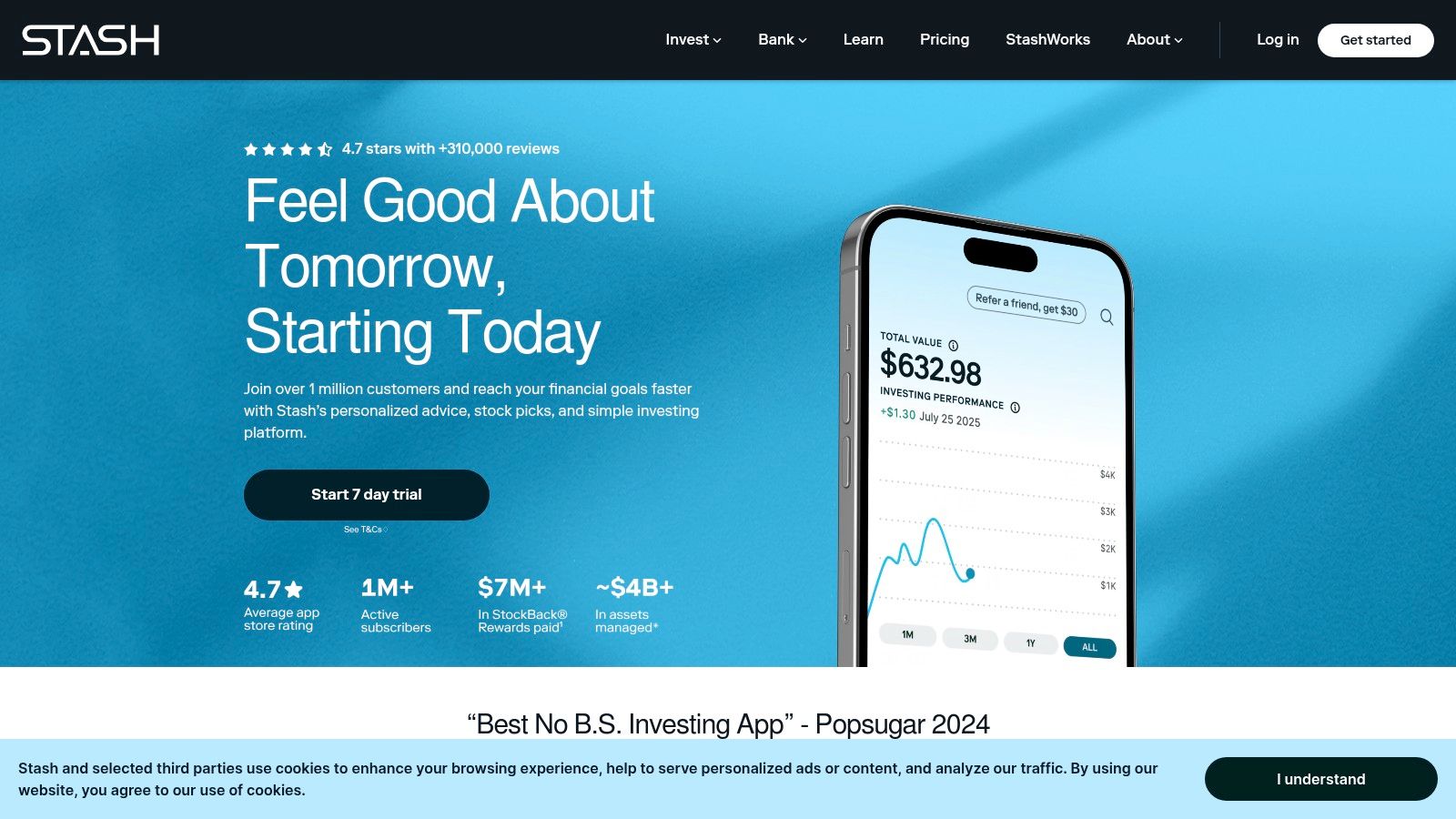
Unlike traditional brokers, Stash bundles its services into simple monthly plans, removing the complexity of per-trade fees. The platform’s guided onboarding and integrated educational content help demystify financial concepts. Features like the Stock-Back® Card, which rewards spending with stock, and automated investing tools encourage building wealth incrementally. The app's design promotes a buy-and-hold strategy over active trading.
Key Features & Costs
Pros:
- Guided Onboarding: The app is exceptionally beginner-friendly, with strong educational support.
- All-in-One Platform: Integrates investing, banking, and budgeting tools seamlessly.
- Flat-Fee Simplicity: Predictable monthly costs cover multiple account types and features.
Cons:
- Fee Structure: The monthly fee can be high as a percentage for accounts with very small balances.
- Limited Trading Control: Scheduled trading windows are not suitable for active traders who need immediate execution.
Stash’s automated tools are excellent for implementing strategies like dollar-cost averaging. To understand this concept better, you can learn more about what is dollar-cost averaging and how it works.
Visit Stash
11. Public
Public combines commission-free stock and ETF trading with a strong social and educational component, making it one of the best investment apps for beginners who want to learn alongside a community. It offers a unique blend of traditional assets like stocks and ETFs with modern alternatives, including cryptocurrencies, bonds, and even collectibles like art and royalties. The platform’s design is clean, encouraging users to discover and discuss investment ideas.
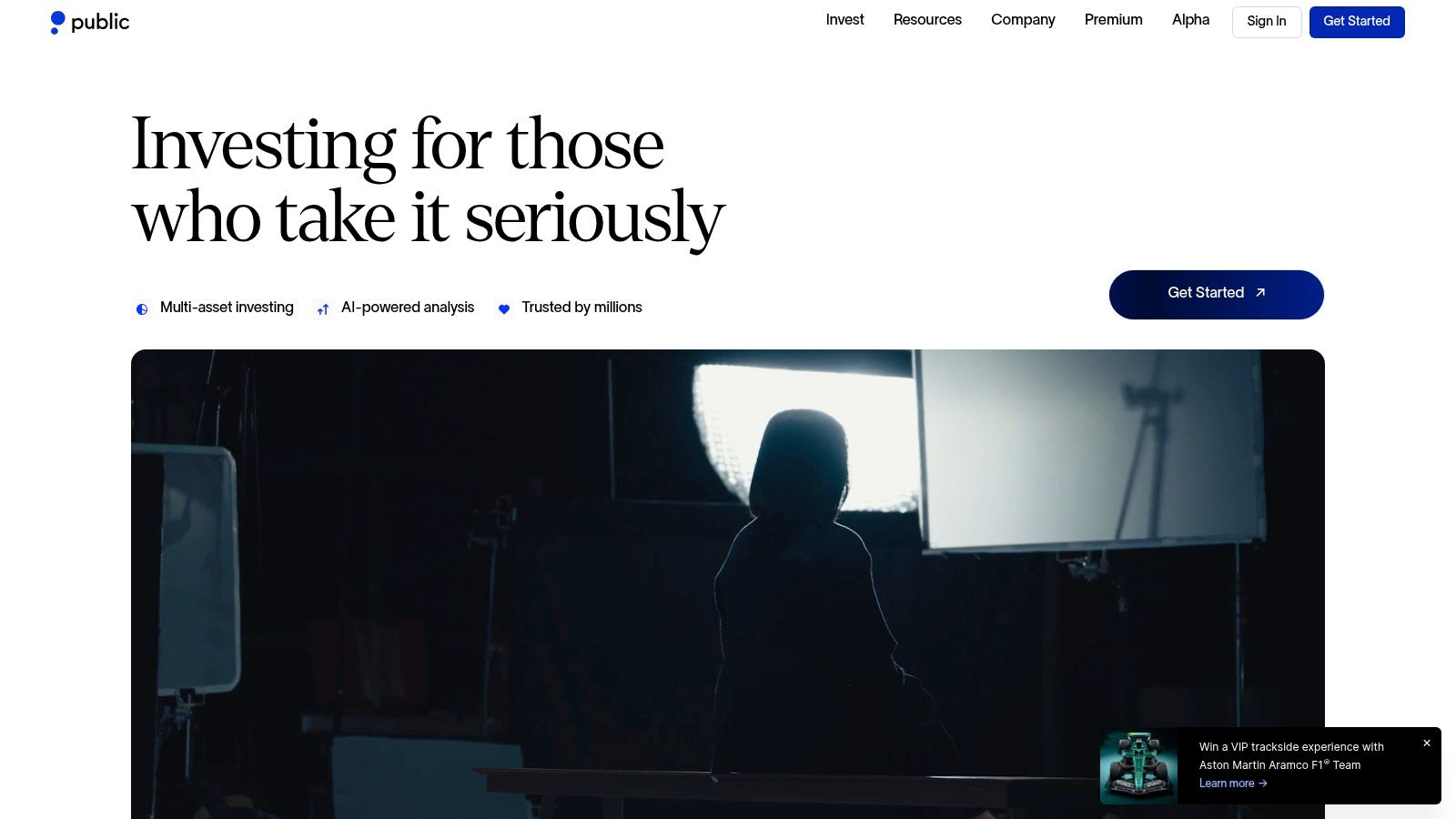
A key differentiator for Public is its access to yield-generating products that are typically complex for newcomers. This includes a high-yield cash account with up to $5M in FDIC insurance coverage and Treasury accounts that provide easy access to government-backed T-bills. By integrating social features, Public allows investors to follow experienced traders, participate in discussions, and gain insights, flattening the learning curve for those just starting out.
Key Features & Costs
Pros:
- Diverse Asset Selection: Offers a rare mix of stocks, crypto, bonds, and alternatives for beginners.
- Community-Focused Learning: The social feed helps new investors learn from others.
- Easy Access to Yield Products: Simplifies investing in high-yield cash and Treasury bills.
Cons:
- Variable Fees: Fees and yields on non-stock products like Treasuries can change, so you must verify current terms.
- Social Features Can Be Distracting: The community aspect may encourage trend-chasing if not used carefully.
Visit Public
12. M1 Finance
M1 Finance offers a unique, hybrid approach that blends automated investing with individual stock and ETF selection, making it one of the best investment apps for beginners who want to build custom, long-term portfolios. Its signature feature is the "Pie," a visual tool that allows you to create a diversified portfolio by assigning percentage targets to different stocks and ETFs. The platform then automatically maintains your target allocations through rebalancing.
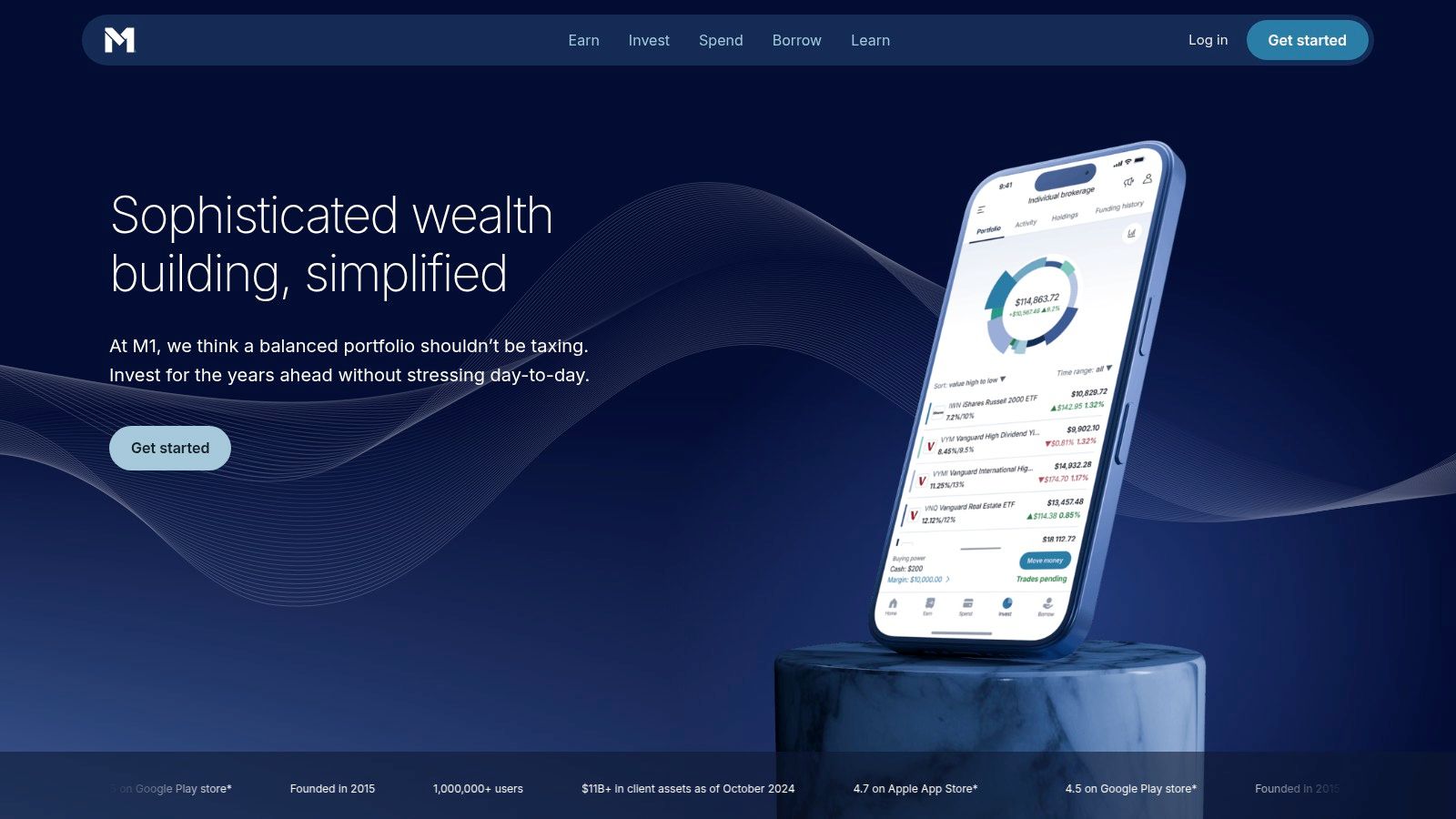
This goal-based system uses fractional shares by default, ensuring every dollar is invested according to your plan. M1 Finance also provides integrated banking features, including a high-yield savings account and a flexible line of credit, allowing you to manage your finances in one place. The platform supports taxable brokerage accounts and IRAs, catering to various long-term financial goals.
Key Features & Costs
Pros:
- Excellent for Set-It-and-Forget-It Portfolios: The automated rebalancing and contribution features are ideal for passive investors.
- Intuitive Portfolio Building: The "Pie" interface makes diversification simple and visual.
- Fee Waiver Options: The platform fee can be avoided by meeting a reasonable asset threshold.
Cons:
- Platform Fee for Smaller Accounts: Accounts under the $10,000 threshold incur a monthly fee.
- Limited Trading Control: Designed for long-term investing, not active day trading.
Visit M1 Finance
Top 12 Investment Apps Feature Comparison
Making Your Final Choice and Next Steps
Navigating the world of investing has never been more accessible, thanks to the powerful tools packed into today's mobile apps. We've explored a wide range of options, from established brokerage giants like Fidelity and Charles Schwab to innovative fintech platforms like Acorns and M1 Finance. Each app presents a unique pathway into the market, catering to different goals, risk tolerances, and investment styles.
The key takeaway is that there is no single "best" app for everyone. Your ideal choice depends entirely on what you, as a new investor, prioritize. The journey to financial growth is deeply personal, and the right tool is one that aligns with your specific objectives and makes you feel confident and in control.
How to Choose the Right App for You
To make your final decision, reflect on what you truly need from an investment platform. Are you looking for a completely hands-off approach, or do you want to actively learn and pick your own stocks? Answering these questions will help narrow down your options significantly.
Consider these key decision points:
- For the "Set It and Forget It" Investor: If your goal is to build wealth passively without day-to-day management, apps like Acorns or Stash are excellent. Their automated round-up and recurring investment features make saving and investing a seamless part of your daily routine.
- For the All-in-One Growth Seeker: If you want a robust platform that offers a vast library of educational resources, professional research, and a wide selection of investment products that can grow with you, Fidelity or Charles Schwab are top-tier choices. These platforms provide the foundation for a lifelong investing journey.
- For the Active, Hands-On Learner: If you're excited by market trends and want to actively trade stocks and ETFs with zero commissions, platforms like Robinhood and Webull offer user-friendly interfaces and advanced charting tools that cater to a more engaged approach.
- For the Holistic Portfolio Optimizer: If you already have accounts spread across different platforms or plan to, PinkLion offers a unique and powerful solution. It's not a brokerage itself, but a smart portfolio dashboard that connects all your accounts. This gives you a complete, unified view of your entire financial picture, allowing you to analyze your combined assets with sophisticated AI-driven tools.
Your Actionable Next Steps
Feeling empowered is the first step; taking action is the next. Don't let analysis paralysis hold you back. The best time to start investing was yesterday, but the second-best time is today.
- Define Your Primary Goal: Write down your main objective. Is it saving for a down payment, planning for retirement, or simply learning how the market works?
- Select Your Top Two Apps: Based on your goal, choose the two apps from our list that seem like the best fit.
- Explore and Fund One Account: Download your top choice, explore its features, and start with a small, manageable amount of money. The experience of making that first investment is an invaluable learning tool.
Ultimately, choosing from the best investment apps for beginners is about finding a partner for your financial journey. The right app will not only facilitate your trades but will also educate, empower, and adapt to your evolving needs as you transform from a novice into a seasoned investor.
Ready to see your entire investment portfolio in one place and gain a deeper understanding of your financial health? Connect your brokerage accounts to PinkLion for free and use powerful AI-driven insights to analyze your assets, stress-test your strategy, and make more informed decisions. Get started on your path to smarter investing at PinkLion.
